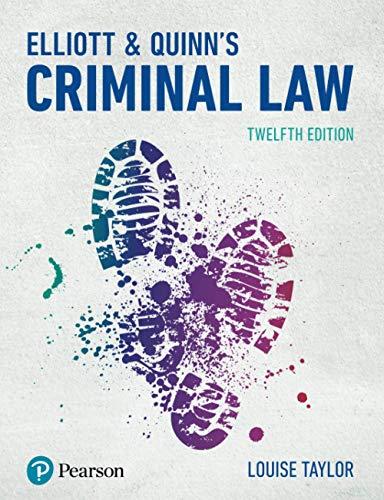Question
1.An employee may not act in the capacity of agent. TrueFalse 2.Independent contractors have no control over the details of their work performance. TrueFalse 3.An
1.An employee may not act in the capacity of agent.
TrueFalse
2.Independent contractors have no control over the details of their work performance.
TrueFalse
3.An agreement to form an agency relationship can be oral.
TrueFalse
4.Remedies of the agent for breach of duty by the principal follow normal contract and tort remedies.
TrueFalse
5.Ratification occurs when a principal accepts responsibility for an agent's unauthorized act.
TrueFalse
6.An agency coupled with an interest is an agency created for the agent's benefit.
TrueFalse
7.An agency relationship may be terminated by an act of the parties but not by operation of law.
TrueFalse
8.Corporate profits could be subject to double taxation.
TrueFalse
9.A corporation cannot be held liable for the criminal acts of its employees.
TrueFalse
10.A holding company is a company whose business activity consists of holding shares in another company.
TrueFalse
11.A corporation formed in another country but doing business in the United States is referred to in the United States as an alien corporation.
TrueFalse
12.To pierce the corporate veil means to ignore the corporate structure exposing the shareholders to personal liability.
TrueFalse
13.A product liability action based on negligence does not require the plaintiff and the defendant to be in privity of contract.
TrueFalse
14.To succeed in a strict liability suit, an injured plaintiff must be more than a mere bystander.
TrueFalse
15.Many jurisdictions will consider the negligent actions of both the plaintiff and the defendant when apportioning liability in a product liability action.
TrueFalse
16.Causation in fact can be determined by use of the "but for test."
TrueFalse
17.Proximate cause exists when injuries sustained were too remotely connected to an incident to trigger liability.
TrueFalse
18.A person assumes all risks associated with any activity, which he or she participates.
TrueFalse
19.A defense available in an action based on a negligence theory is that the plaintiff failed to prove one or more of the required elements.
TrueFalse
20.Under their police powers, states can only regulate public activities, such as political demonstrations.
TrueFalse
21.The Constitution expressly excludes state regulation of commerce.
TrueFalse
22.The First Amendment does not protect corporate political speech.
TrueFalse
23.A law that has any impact on religion is unconstitutional.
TrueFalse
24.Picking pockets is not robbery.
TrueFalse
25.A person who commits larceny can be sued under tort law.
TrueFalse
Step by Step Solution
There are 3 Steps involved in it
Step: 1

Get Instant Access to Expert-Tailored Solutions
See step-by-step solutions with expert insights and AI powered tools for academic success
Step: 2

Step: 3

Ace Your Homework with AI
Get the answers you need in no time with our AI-driven, step-by-step assistance
Get Started


